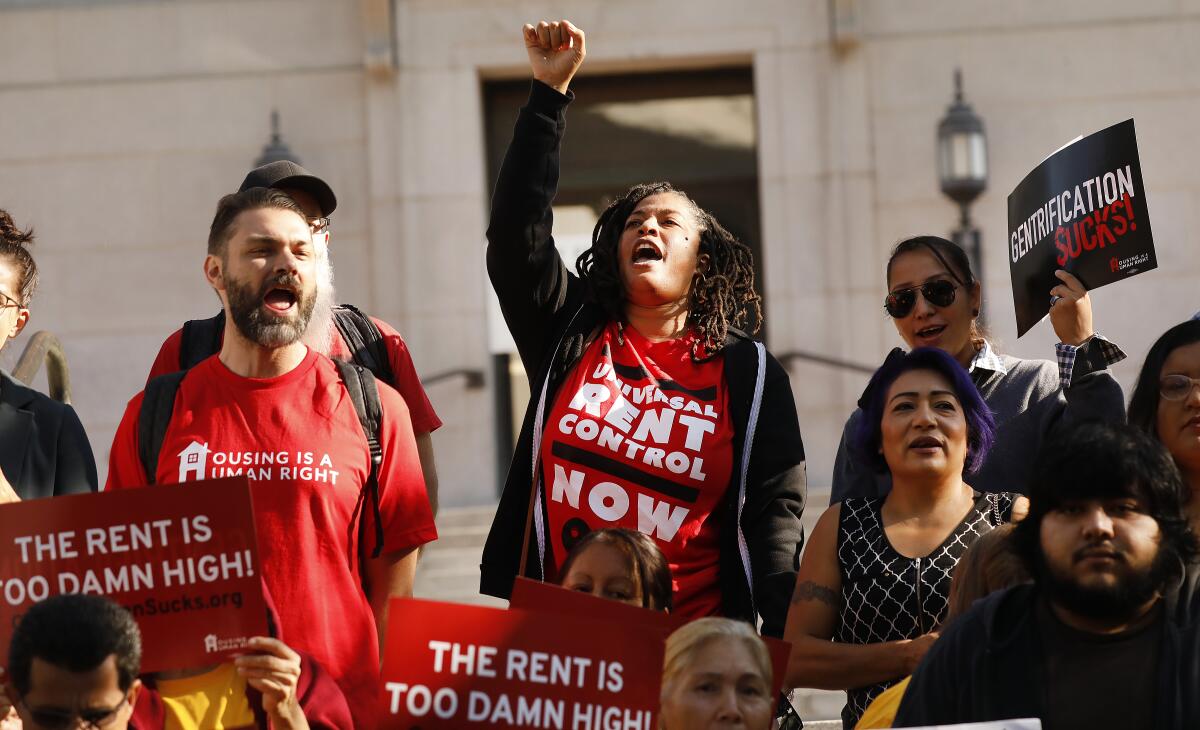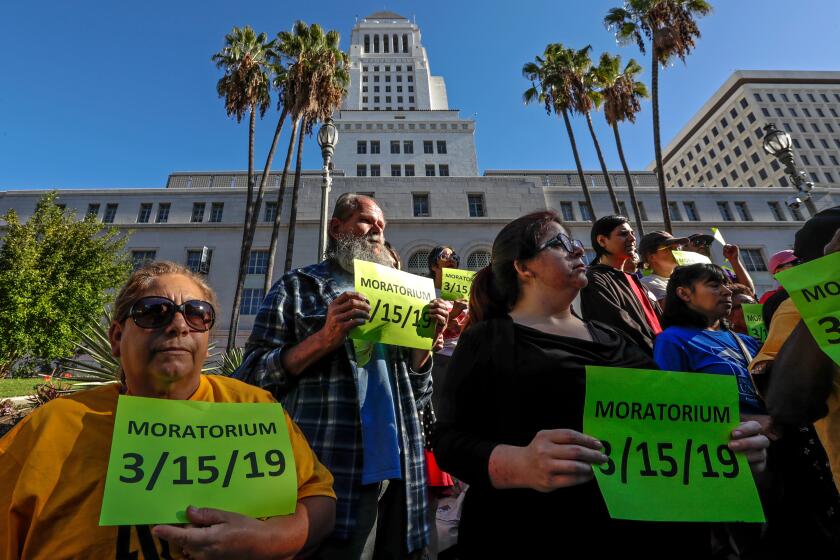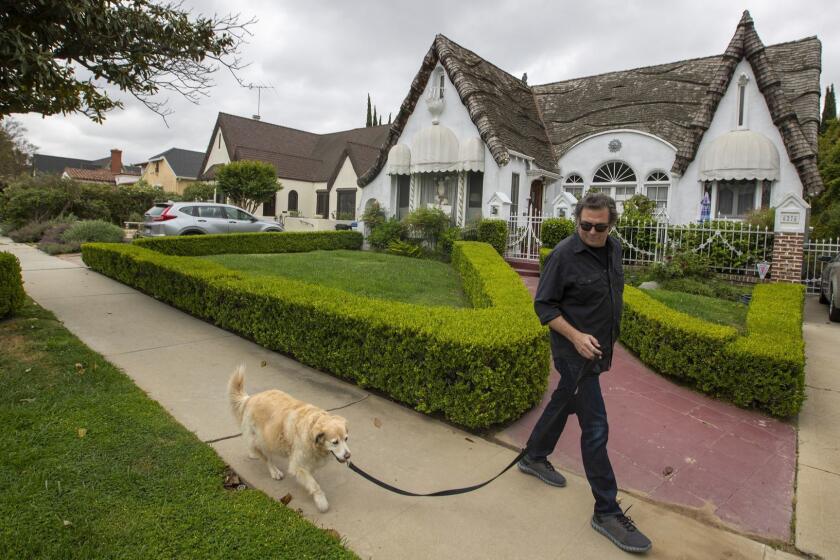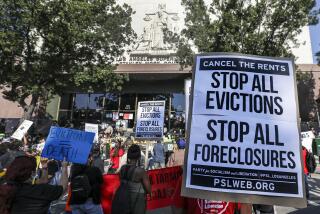Column: At L.A. City Hall, victory went to the little guy in battle over rents and evictions

Diana Castellanos and her husband have three daughters, a two-bedroom apartment in South Los Angeles, and two full-time jobs.
But the recent notice of a looming rent increase, from $1,495 to $2,350 a month, left them in a panic.
“It’s already tight,” said Castellanos, a city employee who works as a parking attendant while her husband is assistant manager of a Hollywood theater. “Gas costs more. Food costs more. Clothes cost more.”
The rent hike was as good as an eviction, since they couldn’t afford it. So the family began searching for another place to live, but that was a discouraging adventure here in the land of high rents and flat wages.
“We went to Alhambra, Burbank, Van Nuys,” Castellanos said, and the cheapest two-bedroom that might work for them was priced at $1,895 a month.
They decided to fight instead of move, which took Castellanos to Los Angeles City Hall on Tuesday morning to join other renters in protesting a spate of recent rent increases and eviction notices. She went home happier than when she arrived. The City Council voted unanimously to slap an emergency moratorium on evictions, and Mayor Eric Garcetti signed the ordinance, which was proposed by Councilman Mitch O’Farrell.
L.A.’s emergency moratorium on no-fault evictions stops landlords from booting tenants before new statewide rental rules take effect.
In L.A., residents of buildings constructed before October 1978 enjoy protections against unfair evictions and big rent increases, but those who live in newer buildings have very little security. A new state law that kicks in on Jan. 1 will cap rent increases at 5% per year plus the cost of inflation and give many renters more protection. And once the state law goes into effect, it will also roll back recent rent increases in excess of the cap, like the one Castellanos was slapped with.
But some local landlords appeared eager to get rid of tenants, either by evicting them or raising rents sharply in hopes of ousting them before the law takes effect, which prompted Tuesday’s action by City Hall. Housing advocates told me they had seen a spate of eviction notices and rent increases — and tenants flocking to them for help.
“Greed always finds a way to get around the law,” Elena Popp, director of the Eviction Defense Network, said at Tuesday’s rally on the south steps of City Hall.
As my colleague Andrew Khouri reported, landlord attorney Dennis Block boasted to 200 apartment owners at a trade show two weeks ago that he had evicted “more tenants than anybody else on the planet Earth,” a line he’s used in the past.
Block, whose website is Evict123.com, drew laughs from the audience in Pasadena, Khouri reported. In Block’s presentation, he ripped the new rent control legislation and encouraged landlords to quickly deliver no-fault eviction notices to those paying low rent.
I gotta give Block credit: He believes what he says, he stands his ground, and you can stick it in your ear if you don’t like it.
I left him a message Tuesday, saying I’d like to talk about his remarks two weeks ago, and he called me right back. I asked if he took pride in saying he was the king of evictions, despite the well-documented struggles of working folks, and here’s his response:
“I take pride in a free economy and in property rights, which is what the basis of this country was built on.”

I think the country might have been built on a bit more than that. But Block knows who butters his bread, and he’s a free market guy.
“There’s only one segment of society where we’re putting restraints on services or goods, and it’s landlords,” Block said. “And it boggles my mind.”
Well that’s just not true. We regulate the cost of utilities, we set a minimum wage that employers have to pay, and we put limits of one sort or another on a host of other industries.
But Block has his lines down pat.
“There’s no such thing as rent gouging,” he said. “It doesn’t exist. No one is going to pay more for an apartment than what it’s actually worth.”
And what makes prices rise like helium-filled balloons?
“No. 1, rent control,” Block said. I wasn’t quite buying that, but Block plowed on, citing a maze of codes and restrictions that drive up prices.
OK, there’s some truth in that. But Block wasn’t done.
Helping renters, he insisted, amounts to “tenant welfare.”
Is it welfare, or is it a concession to California’s great divide? Prosperity drives poverty here. People flock to high-paying jobs, real estate prices rise faster than wages for the vast majority of people, the middle class shrinks, and the bottom falls out.
If someone who teaches school in Santa Monica has to go all the way to San Bernardino to find affordable housing, don’t we have to figure out better answers?
Society should address that, Block said. Not landlords. And if teachers do move out, maybe prices will fall, he said.
“I think the market will always work it out,” Block said. “I have no doubt.”
I wish I was that confident. When nearly 1 in 3 Californians spend half or more of their income on housing and utilities, thousands commute long distances at a huge cost to themselves and the environment, and 60,000 people in L.A. County are homeless, the market isn’t working things out.
“Housing at the high end is getting built,” but there’s no trickle-down benefit for those in the middle class and beyond, said UCLA professor Scott Cummings.
Cummings led a research team that studied the housing crisis and published a report in June called “Priced Out, Pushed Out, Locked Out.” The team found that, although some rent stabilization exists, hundreds of thousands of L.A. County residents have no protections against huge rent increases. Half a million evictions have been filed in L.A. County since 2010, they found, and our percentage of “rent-burdened” residents is among the highest in the nation.
Dorothy Clark grew up a short stroll from where she now lives, and she looks back fondly on the simple joys of a carefree childhood in Mid-City Los Angeles.
Cummings says he supports the new state limits on rent increases and evictions, and thinks they’re properly balanced.
“Property owners will still be able to get reasonable returns on their investments,” Cummings said, “but they’ll be doing so in ways that are conscious of the needs of tenants to live with some security and stability over time.”
Rent stabilization isn’t a perfect answer. As I’ve said before, it can backfire if it discourages new construction. And in a building where next-door neighbors making $38,000 a year and $500,000 a year, respectively, both benefit equally from rent control.
But it’s one tool among many, including eviction protections, that have to be considered when, for so many people, the available jobs don’t pay the rent. It’s not as if anyone at the local, state or national level has come up with ways of replacing the millions of middle-income jobs that were lost when manufacturing tanked and automation moved in.
At City Hall on Tuesday, Rebekah Danielson said she worked as a manager at a construction company for about $14 an hour. She had been struggling to pay $1,250 a month for her studio apartment in Canoga Park, and she just got hit with notice that, in 60 days, the rent would be going up to $1,585.
She came with her grandfather, Bob Lindhout, a Vietnam veteran who is recovering from cancer treatment and sleeps on the couch in Danielson’s apartment. They also brought their friend Glenn Thobe, an aerospace industry retiree who lives in a one-bedroom at the same complex and is looking at a $300 rent increase that will have him paying $1,600.
Something’s out of whack, Danielson said. She’s working, she’s trying, and she’s awakened each morning by noise from construction of a new apartment complex where, who knows, the rents may be even higher.
“We’ve been paying our rent on time and not causing any problems,” Danielson said, and she’s hoping to hold on. “It doesn’t seem right to put people on the street right before the holidays.”
Steve.lopez@latimes.com
More to Read
Start your day right
Sign up for Essential California for news, features and recommendations from the L.A. Times and beyond in your inbox six days a week.
You may occasionally receive promotional content from the Los Angeles Times.









